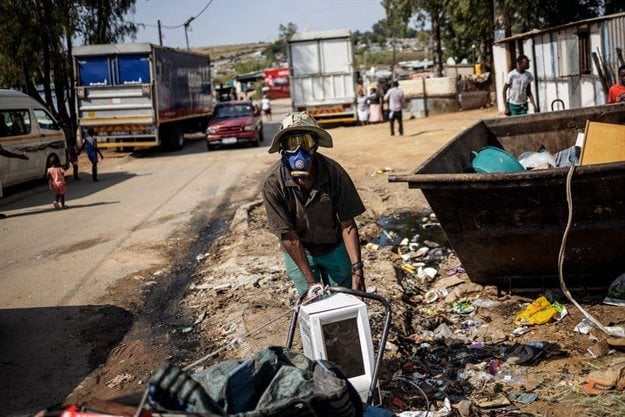
Top stories






More news


Marketing & Media
Ads are coming to AI. Does that really have to be such a bad thing?














Various efforts have been made over the years to try and manage the problems better.
A contentious, and politically sensitive issue in all of these efforts has been the role of waste reclaimers, the informal actors who earn a living by salvaging and selling recyclables.
Like their counterparts across the country, reclaimers in Johannesburg play a crucial role in waste management and recycling. According to the Council for Scientific and Industrial Research, reclaimers collect 80%-90% of all used packaging and paper that is recycled. They also save municipalities up to R748m a year in landfill space. Without them, South Africa’s recycling economy would not exist, and Johannesburg’s landfills would have closed long ago.
Pikitup, the private company created by the city to provide municipal waste management services, only started promoting recycling just over a decade ago. Instead of partnering with the real recycling experts, reclaimers, Pikitup designs charity-style projects for them and gives the official recycling work to unemployed people with no experience in the sector and private companies.
In mid-2018, Pikitup started a separation at source pilot project that pays two private companies to collect recyclables separated from trash by residents in some suburbs.
Now the city wants “affluent” households to pay a new R50 monthly recycling levy to extend the pilot.
But evidence from my three-year research project shows that Pikitup’s pilot has failed to collect significant amounts of recyclables. It has also been far from cost-effective. And it has profoundly negative consequences for reclaimers.
There are approximately 8,000 reclaimers in Johannesburg. Some have been collecting recyclables for more than 30 years and there are families with several generations of reclaimers.
Working with 13 postgraduate students, my research project interviewed and surveyed reclaimers, residents and officials to see how they were
affected by Pikitup’s recycling programmes between 2016 and 2019.
We found that Pikitup’s pilot had a number of negative consequences.
As the contracted companies started collecting the same materials that reclaimers depended on, reclaimers struggled to access recyclables, which decreased their incomes. It also led to increased harassment as reclaimers were accused by residents and security of “stealing” Pikitup’s bags.
The pilot also made life harder for reclaimers in other ways. They had to start sleeping in suburban parks to get to the materials before the private recycling trucks arrived, as otherwise there would be nothing to collect and their children would go hungry.
Pikitup’s approach to recycling has a poor track record.
In 2018/2019, the most recent year for which Pikitup has released complete data, Pikitup planned to collect 50,000 tonnesof recyclables. It then lowered the goal to 32,550 tonnes, but still missed this new target by about 6,500 tonnes.
In the first 12 months of Pikitup’s separation at source pilot – which the levy is set to expand – an internal Pikitup presentation reported that Pikitup diverted only 27,277 tonnes of recyclables.
This is only a fraction of what reclaimers divert in a year. Data from a “resident-reclaimer” recycling pilot project led by the African Reclaimers Organisation in two Johannesburg suburbs shows that participating reclaimers collect an average of 128.18kg per day. If the city’s approximately 8,000 reclaimers salvage similar amounts, they need a mere 27 days to divert as many tonnes of recyclables as Pikitup did in the first year of the city’s pilot.
While the companies in Pikitup’s pilot only collect bags of separated materials, reclaimers in the African Reclaimers Organisation pilot do the same, but also continue to salvage recyclables from rubbish bins. They do this because many residents still throw away recyclables. As a result, reclaimers provide a more effective service, because they ensure that recyclables that residents put in the trash don’t end up at landfills. And they do it for free.
Pikitup’s pilot has a number of inbuilt inefficiencies. For example, Pikitup pays the private contractors between approximately R20 – R25 per household per month to collect separated recyclables. The companies are paid even if a household does not put out a bag of recyclables or a reclaimer collects the bag. The reclaimer is not paid anything.
As Pikitup expands its pilot, the private companies will get the cleanest materials. More reclaimers will lose access to bins, and the recyclables in those bins will end up at landfills.
This is not just bad for reclaimers. It is bad for the environment as landfills will fill up faster and more virgin materials will be used to produce new products. While the companies use trucks to collect recyclables, reclaimers’ trolleys are a low carbon alternative.
It makes more sense to pay reclaimers to collect recyclables as is done in cities in Colombia, India, and Brazil. The African Reclaimers Organisation pilot has shown that reclaimers can provide an efficient, effective, low-carbon service that positively transforms relationships between residents and reclaimers.
Prior to the pandemic, reclaimers in this pilot were paid a service fee based on the kilogrammes of recyclables collected.
More than 2,400 residents have signed the African Reclaimers Organisation’s petition that calls on the municipality to stop the R50 levy and create a reclaimer-based recycling system through consultation with reclaimers.
It is time the city recognised reclaimers’ central role in Johannesburg’s recycling economy and work with reclaimers to build on what exists to create a recycling system appropriate for the South African context. Expanding African Reclaimers Organisation’s pilot would be a great way to start.
This article is republished from The Conversation under a Creative Commons license. Read the original article.![]()

The Conversation Africa is an independent source of news and views from the academic and research community. Its aim is to promote better understanding of current affairs and complex issues, and allow for a better quality of public discourse and conversation.
Go to: https://theconversation.com/africa